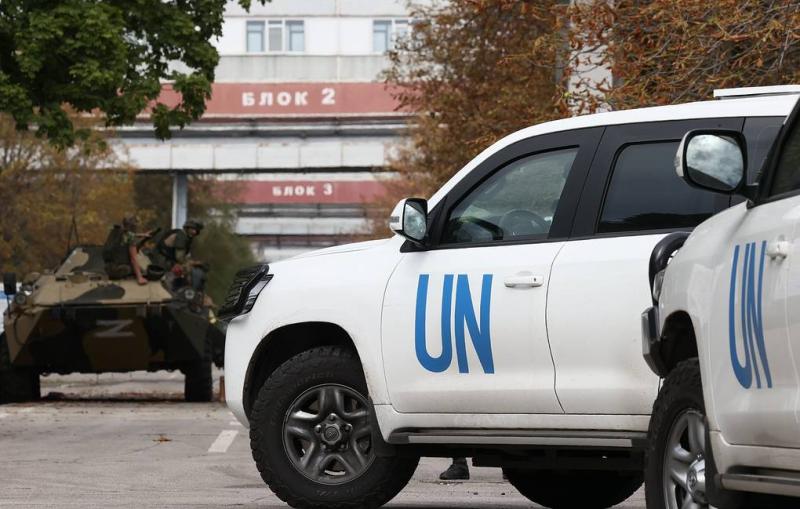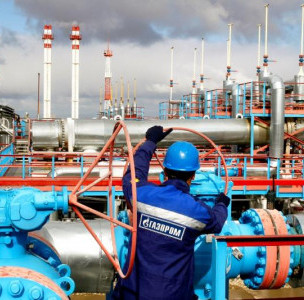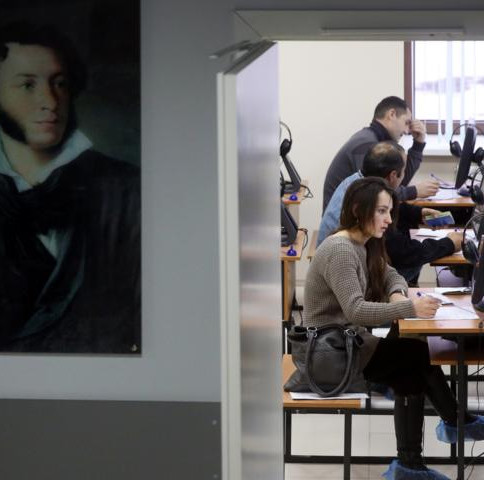
© Sergei Malgavko/TASS
Top stories from the Russian press on Friday, September 2nd, prepared by TASS
Izvestia: IAEA visits Zaporozhye nuclear plant
The IAEA, whose fact-finding mission arrived at the Zaporozhye Nuclear Power Plant (ZNPP) on September 1, plans to ensure its permanent presence at the facility. This idea was supported by Moscow. According to its representatives, this will contribute to stopping the shelling of the nuclear power plant, Izvestia writes. The local military-civilian administration told the newspaper that the permanent mission could include three people who would work on a rotating basis.
Negotiations on the IAEA’s visit to the Zaporozhye plant continued throughout August. By the end of the month, the inspectors received safety guarantees from Russia and Ukraine. The mission left Kiev early in the morning on August 31, and by the middle of the day it had reached Zaporozhye with the intention of visiting the plant on September 1. The inspectors had to pass through many checkpoints, cross the line of contact, and reach Russian territory. Another round of escalation occurred in Zaporozhye on this day.
The Ukrainian side anticipated that the Russian army, which was gathering in the vicinity of Kherson, would not have time to respond to a sudden landing, and that the plant, once in Kiev's hands, would become a Ukrainian foothold. No one would have attempted to storm it, and the IAEA mission would have been met by Ukrainian delegates, military expert Dmitry Boltenkov explained to Izvestia.
It took the inspectors just over three hours to inspect the station on the first day. Part of the delegation, together with the Director General of the NPP, left, and a few IAEA employees remained there. The mission will stay at the Zaporozhye plant area until September 3. They plan to release their findings at a later date.
The head of the IAEA confirmed that he plans to establish a permanent agency presence at the ZNPP. "[The concept of the IAEA having a permanent presence at the ZNPP] seems positive and encouraging," Chairman of the Federation Council Committee on Foreign Affairs Grigory Karasin told Izvestia.
Kommersant: Obscure Hungary-linked company expects to get Shell's share in Russian JV
A little-known shipping company, Wellnord, is claiming Shell's stake in the Salym Petroleum Development joint venture with Gazprom Neft, sources told Kommersant. Its owners were not revealed, but according to open-source information, Wellnord's services are used by a significant oil business on the Black Sea and the Caspian. According to Kommersant's sources, this is a structure with Russian and Hungarian participation. Salym Petroleum has already been re-registered in Russian jurisdiction, and Shell has distanced themselves from the company's management and reset its share valuation to zero.
According to sources familiar with the company's plan, Wellnord is ready to buy out a stake for 150 mln euro. According to one of Kommersant's sources, the deal was negotiated with Russian officials, who are interested in international investors’ attraction to sanction-hit Russian assets.
Despite the sanctions, Hungary is attempting to maintain contacts with Russia, including calls for no limits on oil and gas. As a result, the country has been exempted from EU sanctions against Russian oil, and it is also the only member of the bloc to receive gas in full under a contract with Gazprom.
According to independent analyst Dmitry Kasatkin, Wellnord's cooperation might help Gazprom Neft enter new sales markets. He cannot rule out the possibility that Wellnord’s stockholders are connected to Russian oil and gas players, such as Gazprom Neft, which has experience in Hungary. Considering the relationship between Russia and Hungary, he feels the partner's participation may be a loophole in drawing new investments to Russia.
Vedomosti: Poland seeking $1.3 trillion in damages from Germany for WWII-era Nazi occupation
The damage inflicted by Nazi Germany on Poland during World War II amounts to 6.22 trillion Polish zlotys ($1.32 trillion), according to the leader of Poland's ruling Law and Justice Party Jaroslaw Kaczynski. On September 1, 1939 (the date of the German attack on Poland), he presented a report with calculations to a commission of his fellow party members - Sejm members. According to Kaczynski, this is a conservative estimate, and the figure might go up. Experts interviewed by Vedomosti noted that Germany considers the issue to be long settled and may grow irritated if the claims continue.
The German Foreign Ministry said on September 1 that the issue of reparations to Poland had been resolved when Poland and the USSR back in 1954 rejected additional reparations, and that the German government was not going to consider it again.
According to Alexander Kamkin, a German studies expert, Berlin considers the subject of reparations to be long closed. According to him, Germany will not take Poland's claims for further damages seriously because all territorial and financial disputes have already been settled and there are no legal channels for collecting new reparations.
The demand for more reparations is not a mainstream Polish view, but is part of the political course of the national conservatives from Law and Justice, Stanislav Kuvaldin, a researcher at the European Union Research Sector at IMEMO RAS told the newspaper. The idea of reparations is politically advantageous for the ruling party, but claims against Germany are unusual in and of themselves.
The reparation talk can be fairly harmless as long as it exists solely within Poland's domestic political arena. If the leaders of Law and Justice continue to seek money from Germany, they will receive only annoyance from Berlin, and relations between the neighboring nations will weaken, according to the expert.
Nezavisimaya Gazeta: Russia refuses to sell oil under ‘non-market conditions’
G7 finance chiefs will unveil a plan to implement a price cap for Russian oil on Friday, September 2. The scheme is to keep the price of Russian oil between $40 and $60 in exchange for legal transportation and insurance. On Thursday, Deputy Prime Minister Alexander Novak stated that Russia would simply refuse to sell its oil at non-market prices. Experts told Nezavisimaya Gazeta that they believe that the American plan to exert pressure on Moscow is more likely to fail because heavyweight importers are hesitant to join it. Furthermore, the suspension of Russian oil supplies raises the prospect of sending world prices sky high.
The initiative has caused serious division within the G7, with European officials unconvinced that it will have a big impact on prices. Analysts believe there is no chance of convincing China and India to follow through on the proposal. "The key questions are the list of nations that can join the agreement and the control method. If China and India do not join, the likelihood of such an agreement being implemented is quite low," Director of the Center for Economic Analysis at the Higher School of Economics Marcel Salikhov told the newspaper.
Implementing this strategy, even if it is approved by the G7, will not have any substantial impact on the volume of Russian oil and petroleum product exports, the expert added.
"These two countries [India and China] can receive Russian oil at a discount through direct agreements with Russian suppliers. They do not need to coordinate their actions with the G7," leading expert at the Financial University Stanislav Mitrakhovich added.
"So far, we're only talking about seven countries that don't buy Russian oil anyway," expert in Total Research's strategic research department Nikolay Vavilov believes.
Izvestia: How high can EU electricity prices go?
By the end of the year, electricity in Europe may rise in price 12-15 times higher than in January 2022, according to a forecast by the Russian Chamber of Commerce and Industry. Based on data from the Nord Pool exchange, in January the average price of electricity in Europe was about 90 euro per MWh, and in August in some areas that figure rose to around 1,000 euro. In December 2022, it could reach 1,500 euro, according to experts. Izvestia noted that the driving factors of such rates include rising gas prices, a scarcity of coal supply from Russia due to sanctions, and inadequate efficiency in generating renewable energy sources (such as solar panels and wind farms). Experts do not rule out that many enterprises may close down due to significant price hikes in Europe.
"The high cost of gas and the potential decline in Russian gas supplies in winter are the drivers of the surge in electricity prices in Europe. It is worth recalling the scenario with the repair of turbines for Nord Stream 1, since Germany and Canada themselves cannot figure out the mechanism for enforcing the sanctions," Deputy Chairman of the Supervisory Board of the Reliable Partner Association Andrey Romanchuk said.
The price of electricity is directly related to the price of the energy resources required for its generation - most thermal power plants in EU countries operate on gas, as they gradually abandoned coal consumption, taking into account the ESG agenda, analyst at Freedom Finance Global Vladimir Chernov noted. The generation of electricity at European coal-fired thermal power plants that have stayed active or will be reopened is also growing more expensive, according to the expert.









